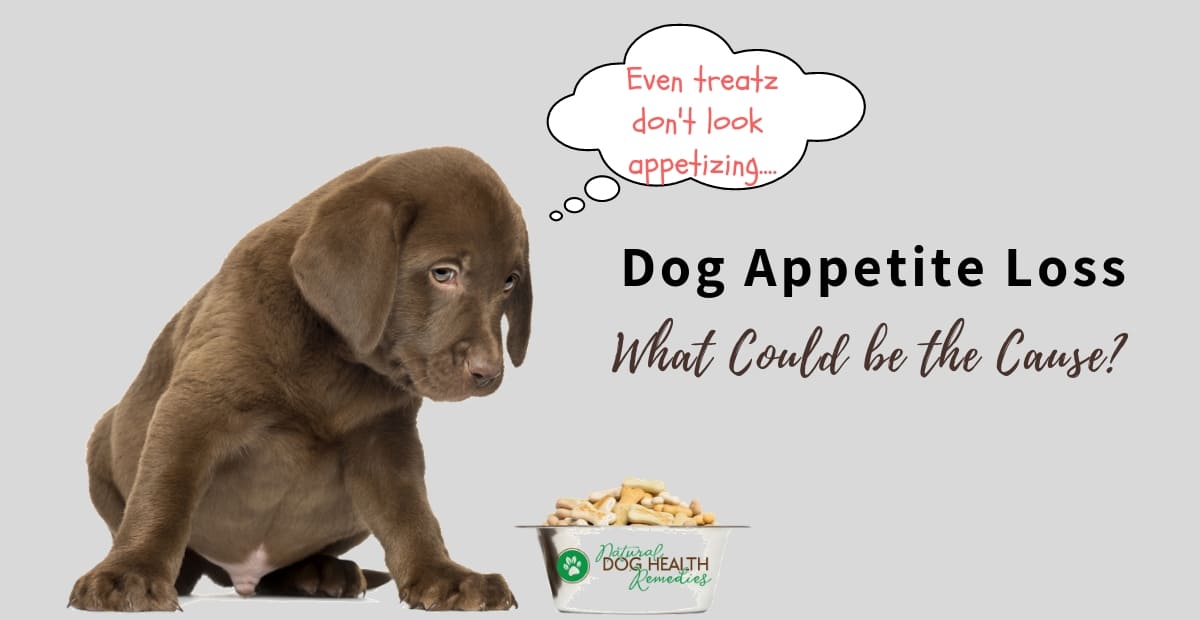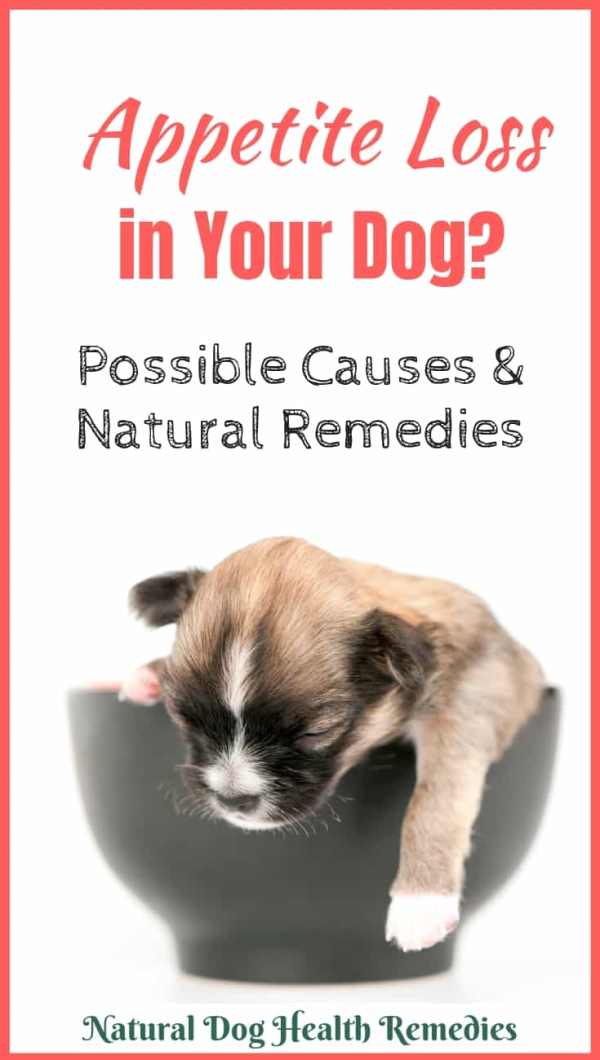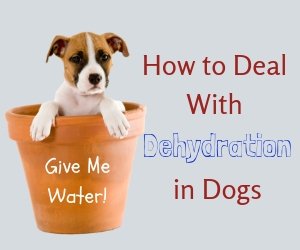Loss of Appetite in Dogs
(FTC Disclosure: If you make a purchase via a link on this page, I may receive a small commission, at no added cost to you.)

Overview
Dogs usually are hearty eaters. Most of the time, they enjoy chowing down their food. They even find stale food or garbage delicious!
But even a chow hound may occasionally lose his appetite due to stress, a lack of exercise, or even a change in the weather.
Temporary appetite loss in dogs is not serious - dogs are by nature hardy animals and can stay healthy and active even if they don't eat for 48 hours.
Believe it or not, dogs are very in tune with their bodies. When they do not feel so well, or when they feel there is a need for internal cleansing (like detoxification), they fast on their own.
But if your dog suddenly has no appetite and energy for more than two days, coupled with weight loss, then you should take her to the vet for a check-up. The appetite loss is most likely caused by some underlying health problem.
What Causes Loss of Appetite in Dogs?
As you can imagine, there are many possible reasons why a dog may lose her appetite. Some common ones include:
Stress
Dogs are animals of habits - they like routines and dislike stress! So when a dog's daily routines are disturbed, or when there is stress in her living environment, she may lose her appetite.
Some examples of stressors could be when there is a new dog in the family, or when she is put in the kennel while her owners are on vacation.
Digestive Problems
Digestive problems such as diarrhea, vomiting, constipation, inflammatory bowel disease, and so on, can also cause a dog to lose her appetite.
If your dog stops eating because of diarrhea and/or vomiting, don't force food down her throat. Fasting for a day or so in this case is actually good for your dog. Just remember to encourage her to drink water to prevent dehydration.
Of course, you also need to find out and address what causes your dog to have diarrhea, vomiting, or other digestive issues.
Bacterial or Viral Infections
Infectious diseases usually cause fever, which in turn may cause a loss of appetite in dogs. In this case, it is also natural and beneficial for the dog to fast.
Temporarily going without food allows the body to devote less energy to digestion and more to fight the bugs that make him sick.
Again, be sure to keep the dog hydrated. One good way is to give your dog some unsalted chicken soup or this Only Natural Pet Human Grade Bone Broth for Dogs & Cats. The taste may entice the dog to drink the soup, and the nutrients in the soup can help the dog fight the infection as well.
Respiratory Diseases
Sometimes, a dog has no appetite when he is suffering from an upper respiratory disease (e.g. asthma, kennel cough). Perhaps the dog doesn't want to eat because he cannot smell the food!
Other Health Problems
Other health problems that may cause dog appetite loss include:
- Dental or peridontal diseases
- Pancreatitis
- Kidney failure
- Urinary tract infections
- Severe worm infestations
- Addison's disease
- Cancer
As you can see, a loss of appetite in dogs can be caused by quite a few different diseases. Be sure to get a medical check-up if your dog stops eating for over 48 hours.
Natural Home Remedies for Dog Appetite Loss
 For the occasional loss of appetite in dogs (and if the dog is otherwise healthy), try some of the following to appetite stimulants.
For the occasional loss of appetite in dogs (and if the dog is otherwise healthy), try some of the following to appetite stimulants.
Herbs
Many dogs like the taste of garlic and in fact a small amount of garlic is good for dogs as it can boost a dog's immune system. (If you are unsure if garlic is safe for dogs, please be sure to read this page.)
Next time when your dog is not eating, trying mixing a small amount of finely chopped fresh garlic (one-eighth to one-fourth of a teaspoon depending on the size of the dog) to his food. The garlic taste may just be the thing that can entice him to eat.
Other herbs that are not only appetite-stimulating but also nutritious include peppermint, fennel, alfalfa, and dill. Just sprinkle some of these dried herbs on your dog's food.
Essential Oils
Depending on the cause of your dog's loss of appetite, you may want to try using various essential oils to help!
For example, if your dog doesn't eat due to stress, consider diffusing some calming and relaxing oils to help ease her stress and calm her down. Lavender (Lavandula angustifolia) and Roman Chamomile (Chamaemelum nobile) are two gentle, dog-friendly calming oils that may help.
If your dog has a digestive issue, you may want to use essential oils that can give digestive support to help your dog. Peppermint (Mentha x piperita) and Ginger (Zingiber officinale) are two good choices.
If your dog just has a sluggish appetite, diffusing some oils that are appetite-stimulating may help perk up her appetite. Citrus oils, such as Sweet Orange (Citrus sinensis) and Grapefruit (Citrus paradisi), as well as the oil Sweet Marjoram (Origanum majorana) are good for stimulating a sluggish appetite.
If you are interested in using essential oils with your dog, here is a useful eBook for you!
Homeopathy
Nux vomica
This homeopathic remedy is effective for dogs who have lost their appetites due to indigestion or constipation. Dogs that need this remedy may vomit or retch. They are depressed and irritable especially in the mornings.
Carbo vegetabilis
This is another remedy that is effective for dogs who have lost their appetites due to poor digestion. Dogs needing this remedy often have gas, and are usually lethargic and weak.
Other Ways to Get a Dog's Appetite Back
You may also want to consider some of these suggestions to help your dog get his appetite back:
Change the Food
Some dogs may stop eating when they do not like their food! If your dog is reluctant to eat her food, try feeding her a new type of food to see if the change can do the trick. If she eats the new food heartily, then you have found a solution to the problem (provided of course that the new food is natural, and of high-quality.)
Warm the Food
Dogs (and cats for that matter) love to eat foods that have strong smells. By warming the dog food a bit, it becomes more aromatic and may just be the way to get the dog eating again.
Give Less Treats
Sometimes a dog's appetite loss is caused by his owner! Maybe the dog is being given a few too many treats! If you think that's the case for your dog, try to give him fewer treats (sorry Fido!). Remember, as a general rule, treats should constitute no more than 10% of a dog's diet.
Add Natural Supplements to the Diet
If your dog's appetite loss is due to poor digestion or indigestion, give him supplements of digestive enzymes to help him digest food and absorb nutrients.
If the appetite loss is due to digestion problems (such as diarrhea, gas, vomiting, and so on), this Chinese herbal supplement may help:
This Chinese herbal remedy is based on a successful patented formula that is effective in managing digestive issues, such as vomiting, diarrhea, regurgitation, poor appetite, and gas.

Dogs in Pain...
 References
References
C.J. Puotinen, Natural Remedies for Dogs and Cats (Keats Publishing, 1999).
M.L. Wulff-Tilford and G.L. Tilford, Herbs for Pets (Bowtie Press, 1999).
R.H. Pitcairn, The Complete Guide to Natural Health for Dogs and Cats (Rodale, 2005).
D. Hamilton, Homeopathic Care for Cats and Dogs (North Atlantic Books, 1999).





